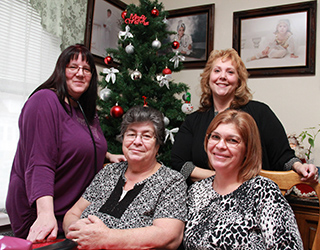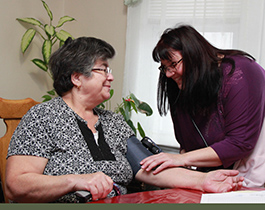Adult Family Care Enriches the Entire Santos Family

In September 2016 the Santos family, of New Bedford, MA, made a life-changing decision that today is proving very wise. Family matriarch Gilda Santos, who recently turned 75, and her daughter Lucy Marques and her husband, Ventura, have lived together for years. Lucy has long cared for her mom, who has memory loss and diabetes, and suffers from chronic leg pain caused by back problems. These limitations require that she receive constant care. But Lucy says that until September, when the family joined the Seven Hills Adult Family Care (AFC) program, “The responsibilities for caring for Mom were becoming overwhelming.”
“Seven Hills provides a much-needed support net for us,” Lucy said. “This has lifted an enormous burden from my shoulders and given me more time to live my own life. They help us find dependable community resources and provide excellent nursing and guidance. Right now, they’re helping us research day program options where Portuguese is spoken, since Mom speaks little English. And they’re always available to bounce ideas off and simply lend a receptive ear.”
Case manager Billi-Jean White said, “Our Seven Hills team is working to find community enrichment for Gilda, so she can be more stimulated during the day, and discover a sense of community outside her home. This will expand her social circle, which usually improves one’s prognosis.”
Lucy works as an intake worker at another social services agency. Her professional knowledge made the Santos’ choice of the Seven Hills AFC program an easy one. “I’m familiar with all the programs available locally,” she said, “so I knew right away that the Seven Hills offering was our best choice. We couldn’t be more pleased.”
The passing of Gilda’s husband two years ago has taken a toll on this entire close-knit family. Here too, the AFC arrangement has helped greatly. The AFC stipend Lucy receives as her mom’s caregiver enables Lucy to spend more time at home, providing Mom extra comfort and closeness. AFC also provides respite care, which offers Lucy an occasional break from her caregiver responsibilities.
Gilda’s physical limitations and forgetfulness require that her health be closely monitored. Every month, her Seven Hills nurse and case worker come for a visit. Recently Billi-Jean and Michelle Call, RN, paid a visit, checking on Gilda’s symptoms, monitoring her medications, doctors' appointments, and other details of care, and answering Lucy’s questions. “Home visits enable the team to make better decisions on Gilda’s self-care ability and appropriate settings for community enrichment,” said Billi-Jean.
“Though Gilda has trouble walking, we always ‘take a stroll,’ repeatedly circling the sofa or kitchen table,” said Michelle. “She seems to embrace this challenge. She’s a tough gal!”

For the Santos family, the bottom line is that Gilda is doing much better now. “I’m so grateful that we are in the AFC program,” Gilda said. “I can continue living at home with Lucy and Ventura, and spend time with their children, and my Seven Hills nurses and case workers are almost like family. And the program gives Lucy the support she needs to care for me and have more time for her own interests.”
Overseeing more than 500 caregiver arrangements, Seven Hills is the premier coordinator of Adult Family Care in Massachusetts. “Seven Hills provides a variety of services to both the adults we support and their caregivers,” said Leslie Courtney, vice president of Seven Hills Family Services. “This gives the caregiver a concrete way to help a loved one in need while receiving comprehensive supports,” Seven Hills provides care coordination, nursing support, ongoing training, respite care, a monthly stipend, and other assistance to ease the responsibilities of care.
“By residing in the family setting, the individual can develop a greater sense of belonging, companionship, independence, dignity, and community integration – in short, the most normal life possible, depending on his or her disability,” Leslie said. “The family setting is the key to improved quality of life, and for elders in need, this can be especially meaningful.”

